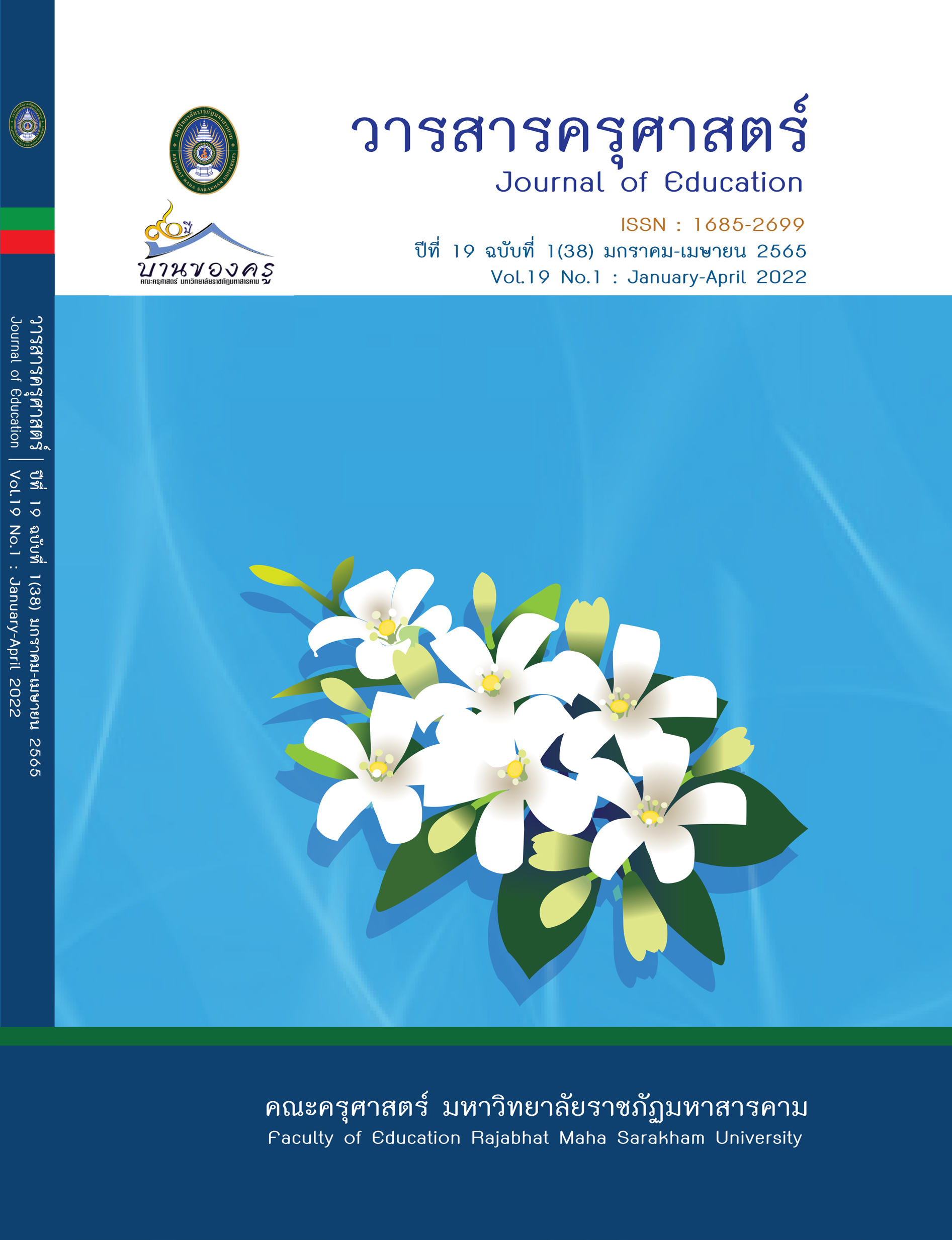The Development of Mathematical Problem-Solving AbilityUsing Discovery Learning for Mathayom Suksa 5 Students
Main Article Content
Abstract
This study was action research, and the purpose of this study was to improve mathematical problem-solving ability using the discovery learning method to achieve the average score of 60% for MathayomSuksa 5 Students. The participants were 31 students from Mathayom Suksa 5 in a classroom of 5/5 at Mahasarakham University Demonstration School (Secondary).The research tools were lesson plans focused on the discovery learning method with a total of 12 plans, a mathematical problem-solving test with 5 questions, and semi-structured interview with five items concerning basic counting principle for Mathayom Suksa 5 students. Percentage, mean, and standard deviation were used to analyze the data.
The results of the research revealed that (1)the students’ overall mathematics ability in problem-solving was at “Good Level”. According to the interviews after math problem-solving activities in each operating cycle, the findings indicated that students were able to identify the questions and the answers, devise a problem-solving plan, solve the math problems with fewer errors, and recheck the answers accurately.Furthermore, (2) after the instruction by using the discovery learning approach, the student’s ability on mathematical problem-solving was exceeded the standard of 60%.
Article Details

This work is licensed under a Creative Commons Attribution-NonCommercial-NoDerivatives 4.0 International License.
ข้อกำหนดเบื้องต้นที่ผู้นิพนธ์(ผู้ส่งบทความ) ควรทราบ
1. ผู้นิพนธ์ที่ประสงค์จะลงตีพิมพ์บทความกับวารสาร ตั้งแต่เดือนมกราคม 2563 เป็นต้นไป ให้ใช้รูปแบบใหม่ (Template 2563) โดยสามารถดูตัวอย่างได้ที่เมนู GUIDELINES
2. จะตีพิมพ์และเผยแพร่ได้ ต้องผ่านการประเมินจากผู้ทรงคุณวุฒิ (Peer Review)
3. การประเมินบทความโดยผู้ทรงคุณวุฒิ (Peer Review) เป็นแบบ Double Blind
4. การอ้างอิงบทความใช้หลักเกณฑ์ APA (American Psychological Association) คลิก
5. บทความถูกปฏิเสธการตีพิมพ์ ไม่ผ่านการประเมิน ผู้นิพนธ์ขอยกเลิกเองหรือชำระเงินก่อนได้รับการอนุมัติ ทางวารสารไม่มีนโยบายการคืนเงิน
References
กระทรวงศึกษาธิการ. (2560). ตัวชี้วัดและสาระการเรียนรู้แกนกลาง กลุ่มสาระการเรียนรู้คณิตศาสตร์ (ฉบับปรับปรุง พ.ศ. 2560) ตามหลักสูตรแกนกลางการศึกษาขั้นพื้นฐาน พุทธศักราช 2551. โรงพิมพ์ชุมนุมสหกรณ์การเกษตรแห่งประเทศไทย จํากัด.
กรรณิการ์ จักรกรด. (2555). ผลสัมฤทธ์ิทางการเรียนคณิตศาสตร์เรื่องการแก้ปัญหาเกี่ยวกับสมการเชิงเส้นตัวแปรเดียว ของนักเรียนชั้นมัธยมศึกษาปีที่ 2 ที่เรียนโดยใช้การสอนแบบค้นพบด้วยการแนะแนวทาง [วิทยานิพนธ์ปริญญาครุศาสตรมหาบัณฑิต ไม่ได้ตีพิมพ์]. มหาวิทยาลัยราชภัฏเพชรบุรี.
กรมวิชาการ. (2543). การสร้างองค์ความรู้ด้วยตนเอง. โครงการส่งเสริมและพัฒนาคุณภาพการศึกษาของสถานศึกษา.
คณิตตา ไวยขุนทด. (2557). การศึกษาเปรียบเทียบผลสัมฤทธิ์ทางการเรียนและความคงทนในการเรียนรู้ของนักเรียน โดยการสอนแบบค้นพบด้วยวิธีแนะแนวทางกับวิธีการสอนแบบปกติ เรื่อง ความน่าจะเป็น สำหรับนักเรียนชั้นมัธยมศึกษาปีที่ 5 [วิทยานิพนธ์ปริญญาครุศาสตรมหาบัณฑิต ไม่ได้ตีพิมพ์]. มหาวิทยาลัยราชภัฏอุบลราชธานี.
จักรพงศ์ พรมคำ. (2562). การพัฒนามโนทัศน์ทางคณิตศาสตร์ เรื่อง สถิติโดยใช้จิตตปัญญาศึกษาและโมเดล การสร้างมโนทัศน์ของลาสเล่ย์และแมทซีนสกี ของนักเรียนชั้นมัธยมศึกษาปีที่ 1 [วิทยานิพนธ์ปริญญาดุษฎีบัณฑิต ไม่ได้ตีพิมพ์]. มหาวิทยาลัยราชภัฏมหาสารคาม.
ชัยยุทธ บุญธรรม. (2549). การพัฒนาชุดการเรียนคณิตศาสตร์ที่เน้นทักษะการแกปัญหาทางคณิตศาสตร์โดย
การสอนแบบค้นพบเรื่องสมการเชิงเส้นตัวแปรเดียว ชั้นมัธยมศึกษาปีที่ 1 [วิทยานิพนธ์ปริญญาดุษฎีบัณฑิต
ไม่ได้ตีพิมพ์]. มหาวิทยาลัยศรีนครินทรวิโรฒ.
ทิศนา แขมมณี. (2550). ศาสตร์การสอน (พิมพ์ครั้งที่ 5). โรงพิมพ์จุฬาลงกรณ์มหาวิทยาลัย.
ประภัสรา โคตะขุน. (2561, 24 กันยายน). การจัดการเรียนรู้แบบค้นพบ (Discovery Method). http://
sites.google.com/site/prinkotakoonlovatt/j2-1
ปรีชา เนาว์เย็นผล. (2538). การแก้ปัญหาทางคณิตศาสตร์ การพัฒนาทักษะการคิดคำนวณของนักเรียน ระดับ
ประถมศึกษา. โรงพิมพ์จุฬาลงกรณ์มหาวิทยาลัย.
ไพศาล วรคำ. (2562). การวิจัยทางการศึกษา (พิมพ์ครั้งที่ 10). ตักสิลาการพิมพ์.
สถาบันส่งเสริมการสอนวิทยาศาสตร์และเทคโนโลยี. (2551). ทักษะ กระบวนการทางคณิตศาสตร์. โรงพิมพ์คุรุสภา
ลาดพร้าว.
สุพัตรา ฉลาดเลิศ. (2560). การศึกษาทักษะการแก้ปัญหาทางคณิตศาสตร์ โดยใช้การจัดการเรียนรู้. แบบสืบเสาะร่วมกับกระบวนการแก้ปัญหาของโพลยา [วิทยานิพนธ์ปริญญาดุษฎีบัณฑิต ไม่ได้ตีพิมพ์]. มหาวิทยาลัยอุบลราชธานี.
สุพรรณี บัวมุล. (2559, 24 พฤศจิกายน). การหาคุณภาพเครื่องมือการวิจัย. Supanneebm. http:// sites.google.com/site/supanneebm/khunphaph
สุวิทย์ มูลคำ และอรทัย มูลคำ. (2545). 21 วิธีการจัดการเรียนรู้ : เพื่อพัฒนากระบวนการคิด. ห้างหุ้นส่วนจำกัดภาพพิมพ์.
สมเดช บุญประจักษ์. (2550). เอกสารประกอบการสอนหลักการคณิตศาสตร์. [เอกสารไม่ได้ตีพิมพ์]. คณะวิทยาศาสตร์และเทคโนโลยี, มหาวิทยาลัยราชภัฏพระนคร.
Alimuddin. (2021). The Impact of Discovery Learning with a Scientific Approach in Mathematics Learning [Unpublished doctoral dissertation]. Universitas Negeri Makassar.
Bruner, J. (1960). The process of education. Cambridge. Harvard University Press.
Clark, H. L. and Starr, S. I. (1986). Secondary and Middle School Teaching Methods. University of Hartford
Hasanah, A. N. (2021). The ability of mathematical problem solving of junior high school students in
situation based learning and discovery learning [Unpublished doctoral dissertation]. Universitas Pendidikan.
Krulik, S. and Rudnick, J. A. (1993). Reasoningand problem-solving: a handbook for elementary school
teachers. Allyn and Bacon.
Lardizabal, A. S et al. (1969). Methods and Principles of Teaching. Quezon City : Phoenix Press.
Moore, K. D. and Quinn, C. (1994). Secondary Instructional Methods. WCB Brown and Benchmark Pub.
Robinson, L. M. (2016). An exploratory study of the factors related to successful mathematical
problemsolving on non-routine unconstrained tasks [Unpublished doctoral dissertation].
Temple University.
Sema, T. (2015). Assessing creative problem solving ability in mathematics: revising the scoring system of the discover mathematics assessment [Unpublished doctoral dissertation]. University of Arizona.
Suzanne, M. B. (2019). The Effect of Creative Dramatics on Problem Solving in a Mathematics Class [Unpublished doctoral dissertation]. Caldwell University.
Teseo, F. R. (2018). Analyses of attribute patterns of mathematical creative problem-solving ability in 6th grade students [Unpublished doctoral dissertation]. John’s University.
Zulkarnai, N. I. (2021). Mathematical communication skills of students in mathematics learning using
discovery learning mode [Unpublished doctoral dissertation]. Lambung Mangkurat University.


